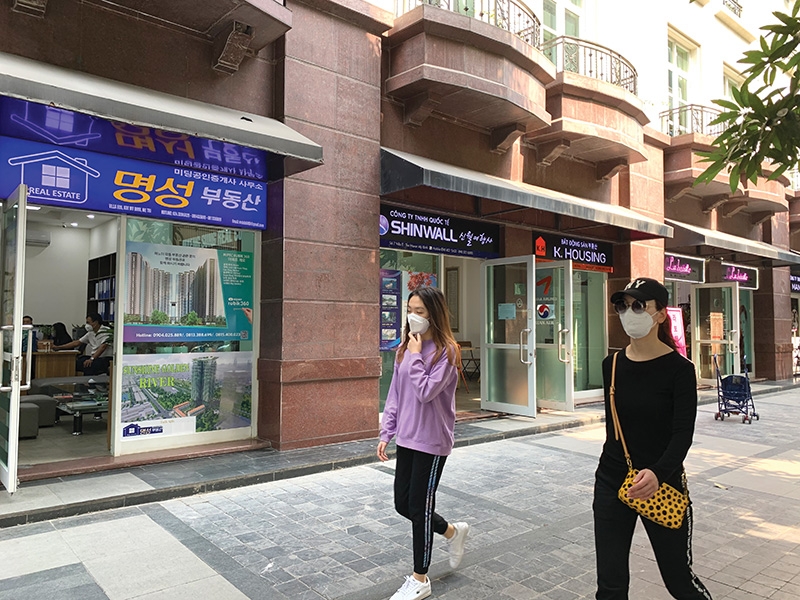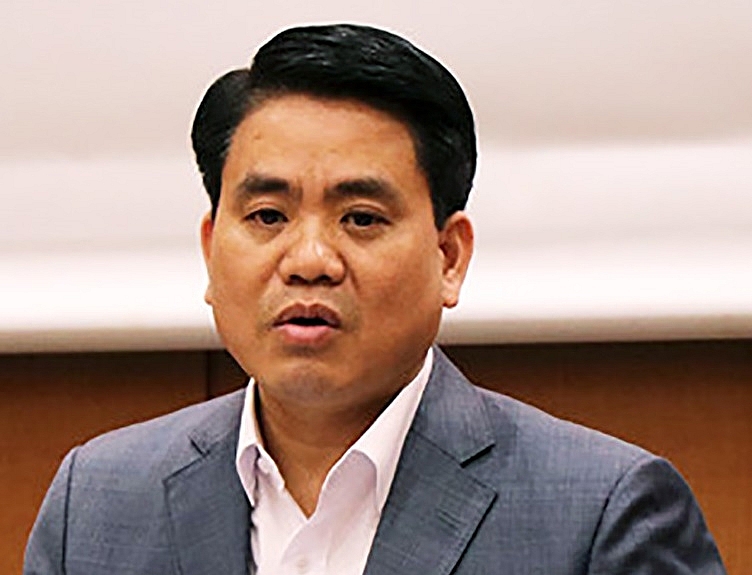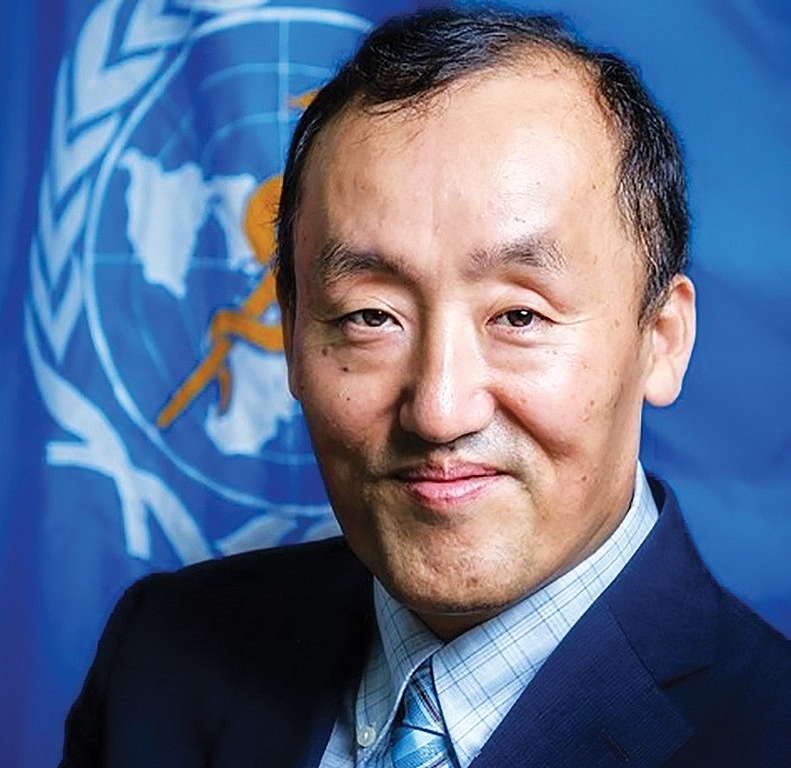Localities shore up defences for contingent of expatriates
 |
| Popular areas for foreigners to live in Vietnam are attempting to get back to some sense of normalcy |
In South Tu Liem and Cau Giay districts of Hanoi, where thousands of South Korean and Japanese people live and work, daily life has become more stable in recent days. Housewives still go shopping at the nearby markets without wearing medical face masks, with several of them saying that the epidemic prevention in Vietnam has been successful and they feel secure enough to get on with their daily lives.
A resident living at the Mandarin Garden building in Hoang Minh Giam street said that there have not been many changes in daily activities, while one South Korean expat told VIR that he commonly leaves home without a face mask because “Vietnam is quite safe, so I don’t worry too much about the outbreak.”
K-Market in Me Tri ward is abustle in the mornings. Dozens of employees are busy unloading goods from trucks before moving into the store, filling up the shelves to start another day of hopefully great sales. “Items in our store are selling like hotcakes, so we usually stock up plenty of goods at the beginning of every day.”
Bakery and cafe Tour Le Jours, located in the same area, does brisk business with a goodly number of customers at any time during the day. Amidst the outbreak, a staff members said that although there are fewer customers, revenue was maintained thanks to the rising number of online orders.
Similarly, a supermarket for Japanese expats draws in sizeable crowds of South Korean patrons due to great demand for food and daily necessities. “We haven’t seen any impact from the outbreak,” said an employee.
The latest information from the Ministry of Health notes that all 16 coronavirus-infected patients in Vietnam have recovered from the illness. Meanwhile, major economies like South Korea and Japan have seen a spike in infections, at over 2,000 and 245 cases, respectively. South Koreans comprise the largest expat community in Vietnam.
Despite the positive developments in preventing an outbreak in this country, the subdued atmosphere still lingers in some areas. Hanoian localities like Tran Duy Hung, Hoang Dao Thuy, and Hoang Ngan are still submerged in near-silence. Last week, shopping malls like The Garden received scant customers and even staff were few and far between.
The K-Food restaurant on the ground floor of Keangnam Landmark 72, where South Korean residents run the majority of businesses, was deserted even at lunchtime. In the afternoon, only five customers came by to take food away. Working at a company based at Keangnam, Young Hee Choi said that he and his colleagues usually take their meals from home or order something to stay away from crowded places.
A worker at K-Food told VIR that customer numbers dropped by 50 per cent since the Lunar New Year holiday when the COVID-19 outbreak in China began to impact Vietnam.
“However, as the epidemic outbreak exploded in South Korea, sales at the shop have dropped by 80 per cent against the usual figures,” he said.
Echoing this, a staff member of a Circle K convenience store explained that since the outbreak emerged, far fewer South Koreans have been coming in than before.
In face of the global spread of the COVID-19, local authorities in Vietnam – a living destination for about 100,000 South Korean people and more than 22,000 Japanese people – have carried out many measures to ensure the health of both locals and expats, from providing masks to disinfecting buildings.
In addition to masks, employees at workplaces like Shinhan Bank wear gloves to open doors in a further attempt to limit the spread of the disease.
Back at Keangnam Landmark 72, which boasts 12 floors for services areas, 28 floors for offices, 20 floors for apartments, and 12 floors of an Intercontinental Hotel, protocols for security and housekeeping staff have been enhanced strongly. “We have the right to refuse any entry or exit if they do not follow the rules on preventing the COVID-19 epidemic,” a staff member at the building told VIR.
After the rise in cases over in South Korea, Keangnam installed carpets containing a disinfectant solution for clients to wipe their shoes. They also require visitors to follow epidemic prevention measures, such as wearing a mask when entering the building and spreading disinfectant liquid for the whole building, in every office.
“Today, we remind clients if they don’t wear a mask. But tomorrow, we will start to refuse entry,” the staff member added.
According to Tran Duc Hoat, Chairman of South Tu Liem People’s Committee, nearly 11,000 foreigners are living in the area, mainly from South Korea, China, and Japan.
He said that nearly 200 South Koreans arrived in Vietnam within the last 14 days, including two from Daegu. One person has already been taken to hospital, and the other remains isolated at home.
What the stars mean:
★ Poor ★ ★ Promising ★★★ Good ★★★★ Very good ★★★★★ Exceptional
Themes: COVID-19
- 67 million children missed out on vaccines because of Covid: UNICEF
- Vietnam records 305 COVID-19 cases on October 30
- 671 new COVID-19 cases recorded on October 1
- Vietnam logs additional 2,287 COVID-19 cases on Sept. 21
- People’s support decisive to vaccination coverage expansion: official
Related Contents
Latest News
More News
- Congratulations from VFF Central Committee's int’l partners to 14th National Party Congress (January 25, 2026 | 09:46)
- List of newly-elected members of 14th Political Bureau announced (January 23, 2026 | 16:27)
- 14th Party Central Committee unanimously elects To Lam as General Secretary (January 23, 2026 | 16:22)
- List of members of 14th Party Central Committee announced (January 23, 2026 | 09:12)
- Highlights of fourth working day of 14th National Party Congress (January 23, 2026 | 09:06)
- Press provides timely, accurate coverage of 14th National Party Congress (January 22, 2026 | 09:49)
- Press release on second working day of 14th National Party Congress (January 22, 2026 | 09:19)
- Minister sets out key directions to promote intrinsic strength of Vietnamese culture (January 22, 2026 | 09:16)
- 14th National Party Congress: Renewed momentum for OVs to contribute to homeland (January 21, 2026 | 09:49)
- Party Congress building momentum for a new era of national growth (January 20, 2026 | 15:00)



 Tag:
Tag:




















 Mobile Version
Mobile Version